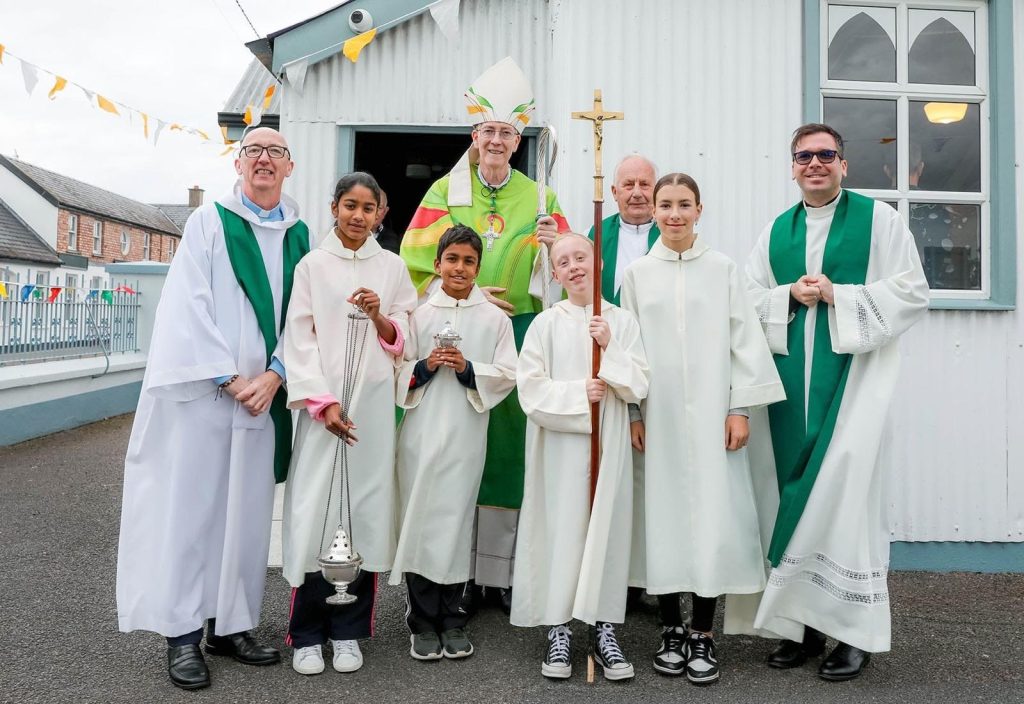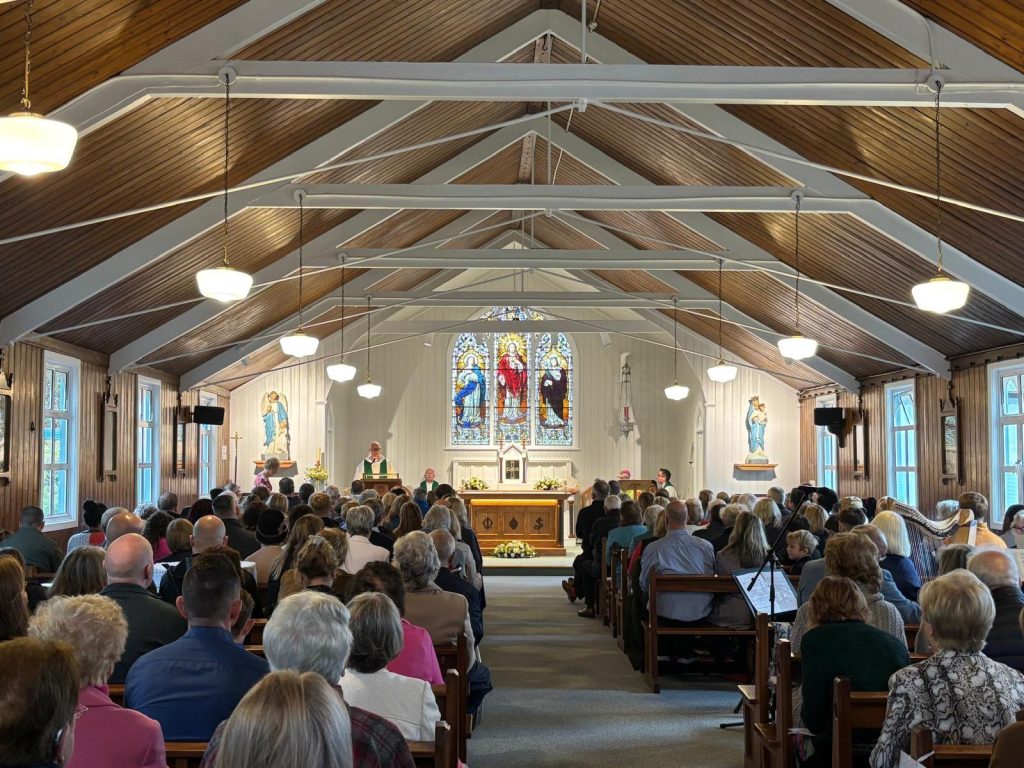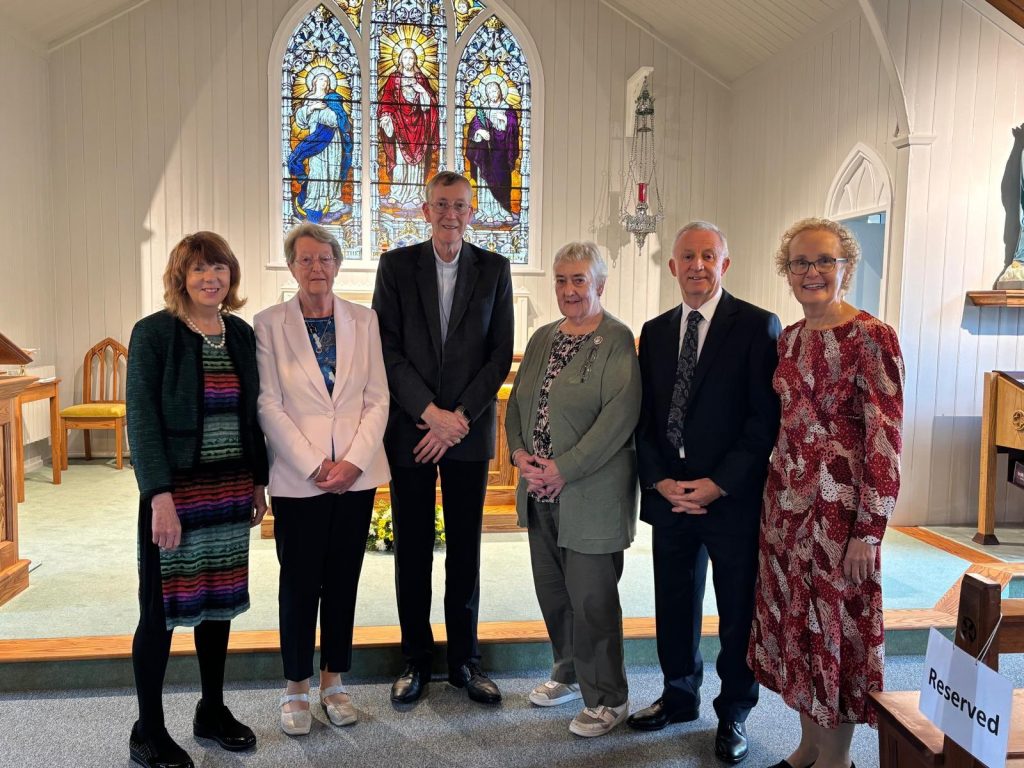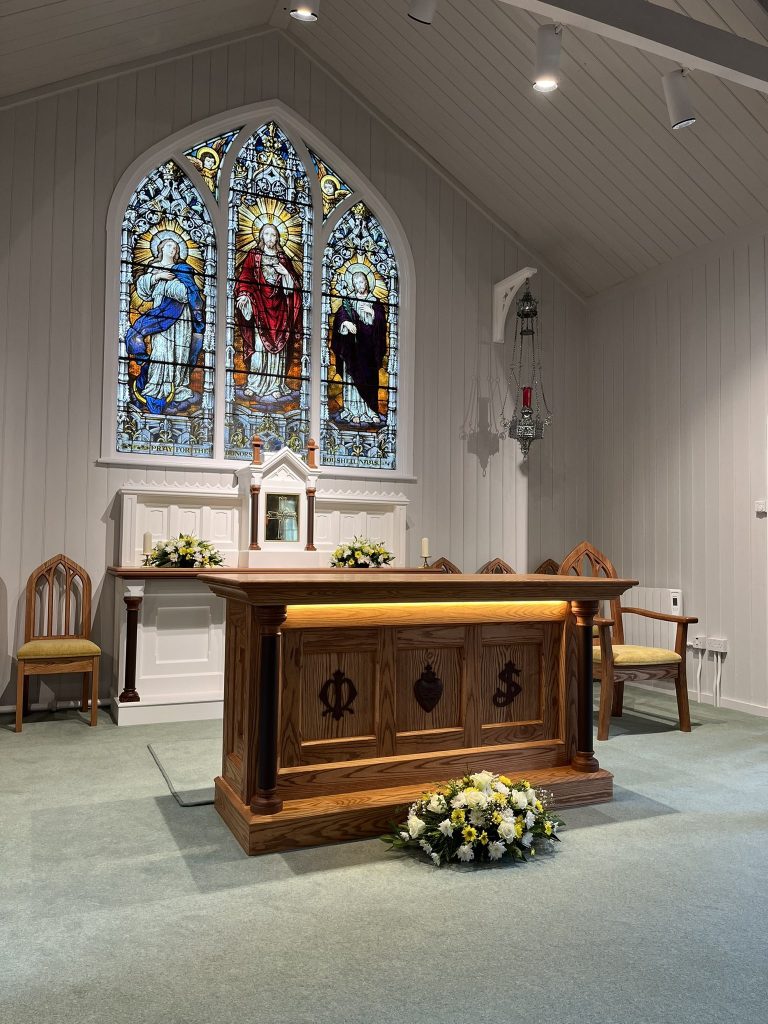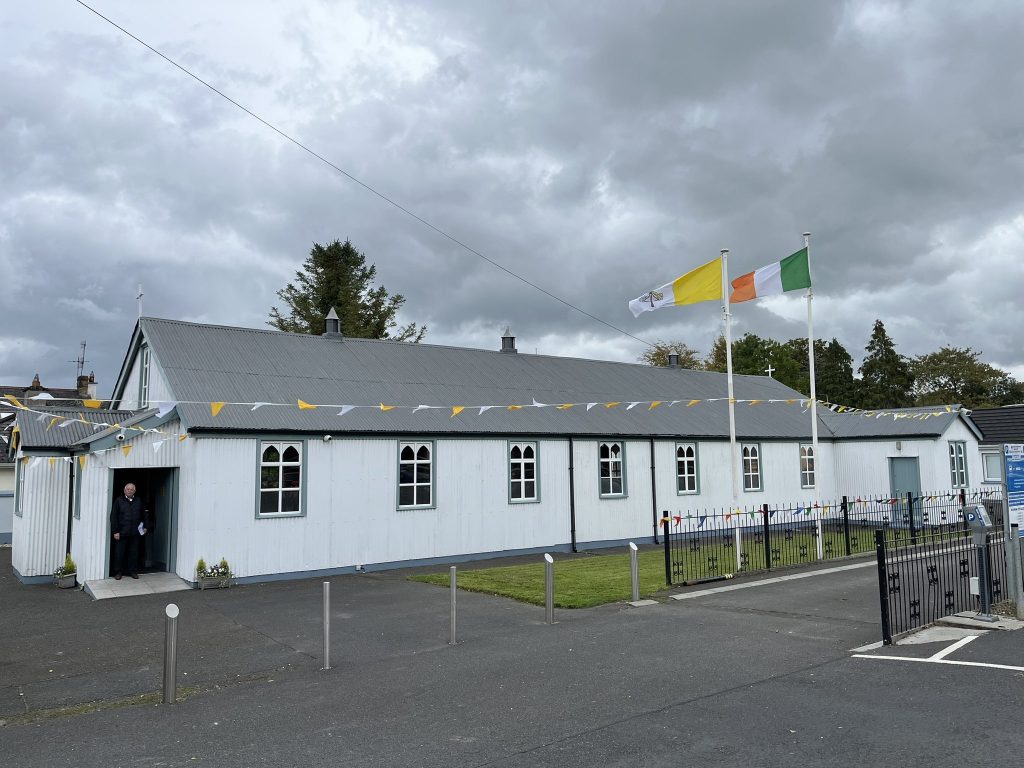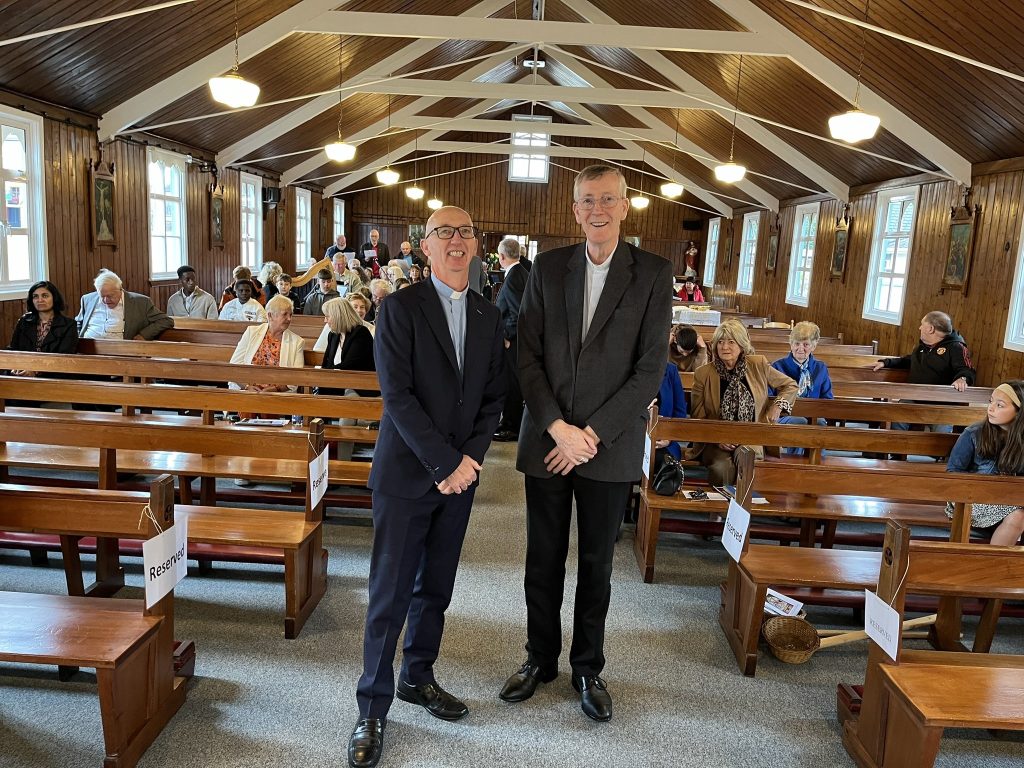Twenty-Sixth Sunday in Ordinary Time – Year B: 29.09.24
11.30am: Our Lady of the Rosary & Guardian Angels – Centenary Mass
Introduction:
This Sunday is the 110th World Day of Migrants and Refugees, a day marked throughout the Catholic Church to pray for all migrants and refugees and to reflect on the reality of migration in our world and in the lives of all people, including in the life of the Church itself. The theme chosen by Pope Francis this year is ‘God walks with his people’.
This Sunday we celebrate the centenary, the 100th Anniversary, of our Parish Church here in Sallins, a Church dedicated to Our Lady of the Rosary and the Guardian Angels. I recall our 90th celebration ten years ago on October 5th, the very date the church was opened one hundred years ago. I read that Bishop Foley was unable to preside at the dedication, because of illness. He asked Fr. Norris, the local PP, who lived until he was 103, and who had spearheaded the project here of building a church, to deputise for him.
World Day of Migrants and Refugees is just ten years older than this church. Liam Kenny in his excellent article in this week’s newsletter speaks of the unique architectural style this church enjoys, arriving as it did like an “Ikea” flat-pack that took a few months to assemble. The outbreak of the First World Way put a huge dent on Fr. Norris’s fund-raising efforts, by 1920 money was scarce but the need for a chapel remained. Fr. Norris, alternative in his thinking, ordered this ‘tin’ church from the firm of Harrison & Co. in London. Examples of similar churches would be found in mission stations, frontier towns, mining camps and military outposts. How appropriate it is to honour Migrants and Refugees and the contribution they make to Irish society and places like Sallins today, in a church that has been built to serve a very mobile and fluid generation.
As Fr. Liam writes, also in the newsletter, this church stands nestled in the heart of our village, a village that has grown and expanded at a rapid pace even since our celebration ten years ago. It’s here sacramental life is honoured. An oasis of calm and prayer amid the activity of commuters young and old.
I’m going to begin our ceremony by blessing water which will be used for sprinkling on you the people who make up this church community, as a sign of repentance and as a memorial of Baptism and for purifying this altar here for the celebration of the Eucharist …
Homily:
1924 was a leap year, 29 days in February as there was this year! In 1924 Ireland competed as an Independent Nation in our first Olympic Games, while we won no medals, the very fact of competing was significant. In 1924 the teaching of Irish was made compulsory in all schools – the then Minister for Education was Eoin MacNeill. And in 1924 Kerry won the All-Ireland Football Championships – ah they were the days, but listen to this – Dublin took the Hurling title!
One hundred years ago is a long period of time and yet so short in many other ways. We recall the ninetieth celebration so vividly, ten years have passed in the blinking of an eye. Our celebration this morning is a commendation of those along with Fr. Norris who had the foresight and vision of honouring the people of Sallins with a Church to call their own. Of course worship of a faith community in Sallins goes much further back than the 1920’s – while there was no chapel of ease or parish church here, there were people of deep faith here who travelled to attend Mass in Naas in the worst of weather conditions.
On World Day of Migrants and Refugees Pope Francis reminds us every encounter with migrant people is an encounter with Christ himself. For migrants God is always a travelling companion. In Ireland we pride ourselves on our céad mile fáilte, but in recent years that failte has been that bit more reserved. Slogans like ‘Ireland is Full’ or ‘Ireland for the Irish’ do nothing to welcome the stranger, those fleeing wars or oppression seeking a better future for their family. I recall the scenes on some of our streets and the misinformation that passes unverified on social media disturb, because this is not the hospitality that we as a nation espouse. I always think of the words of St. Brigid in this 1,500th year of her death as recorded by the scholar Cogitosus, “every guest is Christ”. Not a bad message on this World Day of Migrants and Refugees.
The genesis of this very church are a reminder to us that we are a migrant people. Migration is complex and challenging for so many. For the immigrant or their family forced to flee; for those who welcome them; for governments and civic authorities charged with offering them shelter and for public services such as education and healthcare that are already stretched to their limit. But nothing should allow us to forget that when we meet them, we meet the face of the Lord.
To ask the Church to become more “catholic”. We must widen out tent to embrace everyone. The migrants offer us “a new frontier for mission”. And to the world to more inclusive. We must build bridges that foster a culture of encounter. As a society we have a huge record of charity and compassion. Now is the time once again to dig deep in our welcome, our inclusion and the full participation of migrants and refuges in the life of all our parishes.
The whistleblower John who reports to Jesus on a man who is “not one of us”[1], akin to Joshua’s concerns, conveyed to Moses in the earlier Book of Numbers for Eldad and Medad prophesying in the camp. There is the sense that Moses and Jesus might contain the spirit, restrict the healing, nothing could be further from the truth. To be truly ‘catholic’ means to embrace all, to welcome all, to include all.
May this little church here in Sallins be a constant reminder that we are always to keep our doors open, and to allow ourselves, like the disciples were to be moved from self-absorption to a deeper understanding of what the call to follow Christ entails. A call that is powerfully echoed in the beautiful sentiment in the Prayer of Dedication of the Altar that reads: “Let it be a place of intimate communion with you and a place of peace, where those who feed on the Body and Blood of your Son may be filled with his Spirit and grown in your love. Let it be the source of the Church’s unity and of fraternal harmony, where your faithful, gathering as one, may drink of the spirit of mutual charity”.
[1] Mk.9:38
